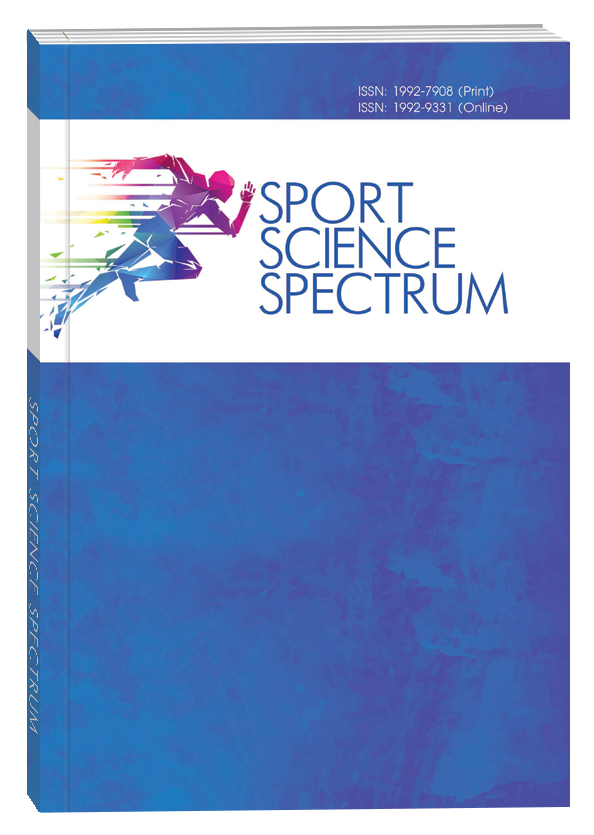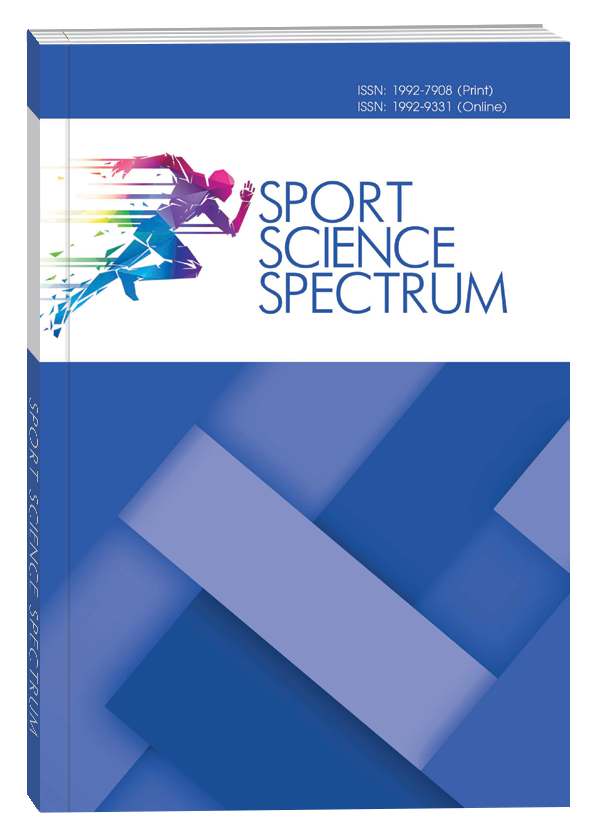SOCIAL SIGNIFICANCE AND ROLE OF PHYSICAL CULTURE AND SPORTS IN THE REHABILITATION AND REINTEGRATION OF WAR VETERANS AND THEIR FAMILIES
DOI:
https://doi.org/10.32782/spectrum/2025-2-12Keywords:
war veterans, adaptive sports, families, inclusion, rehabilitation, reintegrationAbstract
Preconditions: Due to Russia’s armed aggression, the number of veterans in Ukraine is rapidly increasing. This creates an unprecedented demographic change that requires scientific understanding of the socio-economic, psychological and legal consequences. Veterans face physical and psychological trauma, problems of reintegration, employment and adaptation. Physical culture and sports are a powerful tool for simultaneously improving the physical condition, mental health and social adaptation of veterans and their families. Research in this area is critically important for identifying and implementing the best international practices at the national level, which will contribute to the successful integration of veterans into society.The purpose of the study is to summarize international scientific developments on the rehabilitation and reintegration of war veterans and their family members into society and to determine the role of physical culture and sports on this path.Methods: analysis of scientific literature; Connected Papers visual tool, based on the concepts of joint citation and bibliographic linking; synthesis and generalization, systemic approach.Results. Review articles on the rehabilitation and reintegration of war veterans and their families through physical education and sports have been analyzed. It has been found that adaptive sports have a positive effect on the physical, psychological and social well-being of people with disabilities, including veterans, improving their quality of life. The systematic review has confirmed that sports and physical activity are an effective rehabilitation tool for veterans, contributing to the reduction of PTSD symptoms, restoration of physical functions and social reintegration. In general, five groups of related articles have been identified. It has allowed the identification of thematic clusters.Conclusions. International experience confirms the multifaceted positive impact of adaptive sports. Systematic reviews and qualitative studies convincingly demonstrate that the participation of war veterans with disabilities in adaptive sports competitions contributes to significant improvements in the physical health, psychological well-being, and social reintegration of war veterans. International studies highlight both barriers and facilitating factors for the involvement of people with disabilities in sports. An analysis of publications focused specifically on the target group of war veterans and their family members regarding the impact of physical education and sports on their rehabilitation and reintegration has allowed us to identify thematic clusters.
References
1. Аналітична інформація за даними Міністерства у справах ветеранів України. Міністерство у справах ветеранів. URL: https://data.mva.gov.ua (дата звернення: 5.01.2023).
2. Базильчук О. Роль адаптивного спорту у соціалізації ветеранів із фізичними травмами. Physical Culture and Sport: Scientific Perspective. 2025. Т. 2, № 1. С. 242–247. URL: https://doi.org/10.31891/pcs.2025.1(1).96 (дата звернення: 20.06.2025).
3. Кропивницька Т. Види спорту для фізкультурно-спортивної реабілітації ветеранів війни: аналіз міжнародної та вітчизняної практики. Sport Science Spectrum. 2024; 3: 46–51DOI: https://doi.org/10.32782/spectrum/2024-3-7
4. Крушинська Н., Когут І. Вплив занять бігом на рівень стресу в учасників бойових дій. Теорія і методика фіз. виховання і спорту. 2023. № 4, с. 37–41. https://doi.org/10.32652/tmfvs.2022.4.37-41
5. Міністерство у справах ветеранів | Нова ветеранська політика – серед головних напрямів Плану пріоритетних дій Уряду на 2024 рік. Міністерство у справах ветеранів. URL: https://mva.gov.ua/prescenter/category/86-novini/nova-veteranska-politika-sered-golovnih-napryamiv-planu-prioritetnih-dij- uryadu-na-2024-rik (дата звернення: 20.06.2025).
6. Blamey H., Lawson J., Shirazipour C. H. The Invictus Games Categorisation System: A framework for adapted sports. European Journal of Adapted Physical Activity. 2024. Vol. 17. P. 13. URL: https://doi.org/10.5507/euj.2024.010 (date of access: 09.06.2025).
7. A qualitative exploration of the physical and psychological wellbeing of family carers of veterans in Australia / D. Post et al. PLOS ONE. 2022. Vol. 17, no. 6. P. e0269012. https://doi.org/10.1371/journal.pone.0269012 (date of access: 09.06.2025).
8. Blauwet C. A., Kishore M., Viera A. J. Access to adaptive sports: Barriers and facilitators for individuals with disabilities. American Journal of Physical Medicine & Rehabilitation, 2016. 95(6), 463–471.
9. Caddick N., Smith B. The impact of sport and physical activity on the well-being of combat veterans: A systematic review. Psychology of Sport and Exercise. 2014. Vol. 15, no. 1. P. 9–18. URL: https://doi.org/10.1016/j.psychsport.2013.09.011 (date of access: 19.06.2025).
10. Evans A. B., Andreassen S. M. N., Virklund A. W. “Together, we can do it all!”: narratives of masculinity, sport and exercise amongst physically wounded Danish veterans. Qualitative Research in Sport, Exercise and Health. 2019. Vol. 12, no. 5. P. 697–716. URL: https://doi.org/10.1080/215967 6x.2019.1672774 (date of access: 19.06.2025).
11. Heineman J. A. Supporting veterans: Creating a “military friendly” community college campus. Community College Journal of Research and Practice. 2015. Vol. 40, no. 3. P. 219–227. URL: https://doi.org/10.1080/10668926.2015.1112318 (date of access: 13.06.2025).
12. I AM FAMILY: Understanding the adapted sport experiences of family members of military personnel with physical and psychological illnesses and injuries through the lens of the Invictus Games / A. Duong et al. Psychology of Sport and Exercise. 2023. P. 102457. https://doi.org/10.1016/j.psychsport.2023.102457 (date of access: 09.06.2025).
13. Identifying psychological outcomes in families of Five Eyes alliance armed forces Veterans: A systematic review / C. Armour et al. Journal of Military, Veteran and Family Health. 2022. Vol. 8, no. 1. P. 7–27. URL: https://doi.org/10.3138/jmvfh-2021-0025 (date of access: 11.06.2025).
14. Impact of Adaptive Sports Participation on Quality of Life / R. Diaz et al. Sports Medicine and Arthroscopy Review. 2019. Vol. 27, no. 2. P. 73–82. https://doi.org/10.1097/jsa.0000000000000242 (date of access: 11.06.2025).
15. Military Culture and Post-Military Transitioning Among Veterans: A Qualitative Analysis / W. H. McCormick et al. Journal of Veterans Studies. 2019. Vol. 4, no. 2. P. 288. https://doi.org/10.21061/jvs.v4i2.121 (date of access: 20.06.2025).
16. O’Hanlon, Rebecca (2022) ‘You can leave the military, but the military never leaves you.’ An ethnographic study examining the influence of a sport and physical activity-based support programme on veterans undertaking the military to civilian transition. Doctoral thesis (PhD), Manchester Metropolitan University.
17. Physical activity and sport participation in veterans with extremity musculoskeletal disorders / E. Faraji et al. European Journal of Adapted Physical Activity. 2023. Vol. 16. P. 2. https://doi.org/10.5507/euj.2022.002 (date of access: 13.06.2025).
18. Re-theorising inclusion and reframing inclusive practice in physical education / D. Penney et al. International Journal of Inclusive Education. 2017. Vol. 22, no. 10. P. 1062–1077. https://doi.org/10.1080/13603116.2017.1414888 (date of access: 20.06.2025).
19. Special Concerns in Military Families / M. D. Ormeno et al. Current Psychiatry Reports. 2020. Vol. 22, no. 12. https://doi.org/10.1007/s11920-020-01207-7 (date of access: 19.06.2025).
20. The physical, psychological, and social impacts of participation in the Invictus Pathways Program: A qualitative analysis of veterans’ perceptions and experiences / D. Post et al. PLOS ONE. 2023. Vol. 18, no. 10. P. e0287228. https://doi.org/10.1371/journal.pone.0287228 (date of access: 20.06.2025).





